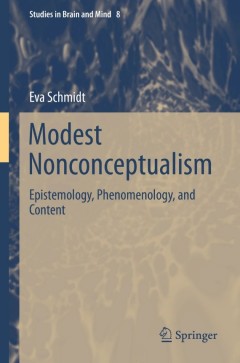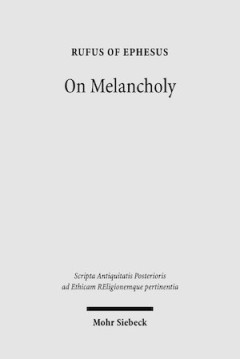Filter by

Mind in Action
The book questions two key dichotomies: that of the apparent and real, and that of the internal and external. This leads to revised notions of the structure of experience and the object of knowledge. Our world is experienced as possibilities of action, and to know is to know what to do. A further consequence is that the mind is best considered as a property of organisms’ interactions with the…
- Edition
- 1
- ISBN/ISSN
- 978-3-319-17622-2
- Collation
- XII, 94
- Series Title
- Studies in Applied Philosophy, Epistemology and Rational Ethics
- Call Number
- -

Modest Nonconceptualism:Epistemology, Phenomenology, and Content
The author defends nonconceptualism, the claim that perceptual experience is nonconceptual and has nonconceptual content. Continuing the heated and complex debate surrounding this topic over the past two decades, she offers a sustained defense of a novel version of the view, Modest Nonconceptualism, and provides a systematic overview of some of the central controversies in the debate. An expli…
- Edition
- 1
- ISBN/ISSN
- 978-3-319-18901-7
- Collation
- xi, 268
- Series Title
- Studies in Brain and Mind
- Call Number
- -

Toward Predicate Approaches to Modality
In this volume, the author investigates and argues for, a particular answer to the question: What is the right way to logically analyze modalities from natural language within formal languages? The answer is: by formalizing modal expressions in terms of predicates. But, as in the case of truth, the most intuitive modal principles lead to paradox once the modal notions are conceived as predicate…
- Edition
- 1
- ISBN/ISSN
- 978-3-319-22556-2
- Collation
- VIII, 190
- Series Title
- Trends in Logic
- Call Number
- -

Engineering Identities, Epistemologies and Values Engineering Education and …
This second companion volume on engineering studies considers engineering practice including contextual analyses of engineering identity, epistemologies and values. Key overlapping questions examine such issues as an engineering identity, engineering self-understandings enacted in the professional world, distinctive characters of engineering knowledge and how engineering science and engineering…
- Edition
- -
- ISBN/ISSN
- 978-3-319-16172-3
- Collation
- 18 b/w illustrations
- Series Title
- -
- Call Number
- -

The Sense of Things
This book proposes a new interpretative key for reading and overcoming the binary of idealism and realism. It takes as its central issue for exploration the way in which human consciousness unfolds, i.e., through the relationship between the I and the world—a field of phenomenological investigation that cannot and must not remain closed within the limits of its own disciplinary borders. The b…
- Edition
- -
- ISBN/ISSN
- 978-3-319-15395-7
- Collation
- -
- Series Title
- -
- Call Number
- -

Epistemologien des Umgebens; Zur Geschichte, Ökologie und Biopolitik künstl…
Der Aufstieg des Begriffs »Environment« zur Beschreibung der Gegenwart markiert den Einfluss, den das Nachdenken über Umgebungsrelationen und die Möglichkeit der technischen Gestaltung künstlicher Umgebungen seit Mitte des 19. Jahrhunderts gewonnen haben.
- Edition
- -
- ISBN/ISSN
- 9783839448397
- Collation
- -
- Series Title
- -
- Call Number
- T 121 SPR e

Epistemische Gewalt; Wissen und Herrschaft in der kolonialen Moderne
Gewalt ist nicht nur Ereignis, sondern auch Prozess und Verhältnis.
- Edition
- -
- ISBN/ISSN
- 9783837651317, 9783839451311
- Collation
- -
- Series Title
- -
- Call Number
- T 121 BRU e

Epistemische Bilder; Zur medialen Onto-Epistemologie der Sichtbarmachung
Wenn in wissenschaftlichen Zusammenhängen etwas sichtbar wird, dann häufig, weil es in experimentellen Verfahren sichtbar gemacht worden ist.
- Edition
- -
- ISBN/ISSN
- 9783732853038
- Collation
- -
- Series Title
- -
- Call Number
- T 121 SCH e

Knowledge in The Age of Digital Capitalism An introduction To Cognitive Mate…
Knowledge in the Age of Digital Capitalism proposes a new critical theory concerning the functioning of capitalism and how we consider knowledge and information. This ambitious book systematically and lucidly introduces contemporary phenomena into the framework of cognitive materialism to address some of the great themes of the social sciences: knowledge, exploitation and social class in an acc…
- Edition
- -
- ISBN/ISSN
- 9781911534242
- Collation
- -
- Series Title
- -
- Call Number
- -

On Melancholy Rufus of Ephesus
Rufus of Ephesus' (fl. ca. AD 100) On Melancholy deals with a medical condition oscillating between madness, depression, and bouts of great creativity. This collection of the Greek, Latin, and Arabic fragments makes this text easily available for the first time.
- Edition
- -
- ISBN/ISSN
- 9783161497605
- Collation
- -
- Series Title
- -
- Call Number
- -
 Computer Science, Information & General Works
Computer Science, Information & General Works  Philosophy & Psychology
Philosophy & Psychology  Religion
Religion  Social Sciences
Social Sciences  Language
Language  Pure Science
Pure Science  Applied Sciences
Applied Sciences  Art & Recreation
Art & Recreation  Literature
Literature  History & Geography
History & Geography